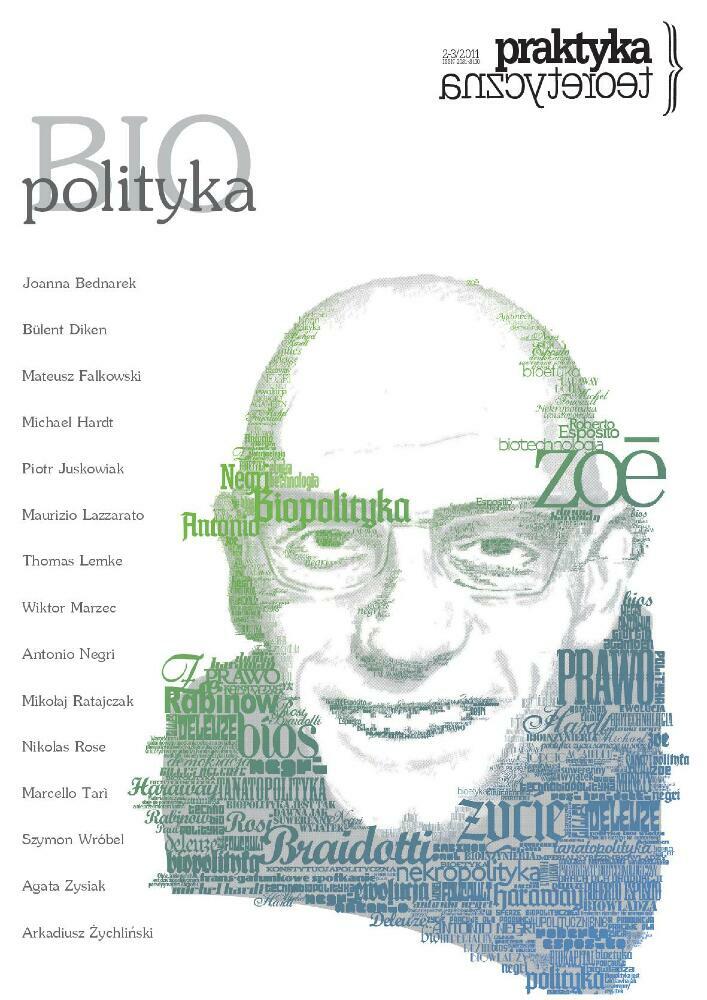Abstract
City of Lodz is an exceptional case of industrial
settlement, a focal point of di}erent kinds and techniques
of power typical for nineteenth century industrial capi-
talism. Disciplinary power parceling bodies, biopower
providing with population stability, paternalistic gaze of
the factory owner and monarchic sovereignty of the tsa-
rist rule once met in the Scheibler and Grohman’s indu-
strial establishment and nearby workers’ housing estate.
{is peripheral capitalism and relations accompanying
it let us verify Foucaultian analysis of power and have a
new look at it. Di}erent and less stable pattern of corre-
lation of power techniques emerges here; power is no
longer strictly related to the temporal matrix or a func-
tional demands of capitalist production, and temporarily
ossi/es in relocated and contingent con/gurations. It is
an implicit illustration of a new paradigm of power ana-
lysis, which Foucault presented when his interest was not
an industrial city any more, namely the „topological
analysis”, as S. J. Collier aptly called it.
References
Ajdukiewicz K. 1983. Zagadnienia i kierunki filozofii. Warszawa: Antyk.
Althusser L. 2010. Ideologie i aparaty ideologiczne państwa. http://www.nowakrytyka.pl/spip.php?article279.
Bauman Z. 2000. Ponowoczesność jako źródło cierpień. Warszawa: Sic!.
Certeau M. 2008. Wynaleźć codzienność: sztuki działania. Kraków: Wydawnictwo Uniwersytetu Jagiellońskiego.
Flatt O. 2002. Opis miasta Łodzi pod względem historycznym, statystycznym i przemysłowym wydana w 1853 roku. Łódź.
Foucault M. 1980. Body/Power. W Power/Knowledge: Selected Interviews and Other Writings 1972-1977. New York: Vintage.
Foucault M. 1995. Wola wiedzy. W Historia seksualności. Warszawa: Czytelnik.
Foucault M. 1998. Nadzorować i karać: narodziny więzienia. Warszawa: Aletheia.
Foucault M. 1998. Trzeba bronić społeczeństwa: wykłady w College de France. 1976. Warszawa: Fundacja Aletheia.
Foucault M. 2000. The Subject and Power. W Power: essential Works 1954-1984. New York: The New Press.
Foucault M. 2010. Bezpieczeństwo, terytorium, populacja: wykłady w College de France 1977-1978. Warszawa: Wydawnictwo Naukowe PWN.
Gąsiorowska N. 1957. Przedmowa. W Źródła do historii klasy robotniczej okręgu łódzkiego. Warszawa.
Howard E. 2009. Miasta ogrody przyszłości [1902]. Milanówek.
Jay M. 1999. Nowoczesne władze wzroku. W Przestrzeń. filozofia i architektura. Poznań: Fundacja Humaniora.
Karwacki W. L. 1975. Łódź w latach rewolucji 1905-1907. Łódź.
Kesan J., Shah R. 2007. “How Architecture Regulates”. Journal of Architectural and Planning Research 24 (4) : 350-359.
Kobojek G. 1998. Księży Młyn. Łódź.
Kołodziejczyk R. 1974. Pochodzenie i źródła rekrutacji klasy robotniczej. W Polska klasa robotnicza: zarys dziejów. Warszawa.
Kurowski M. 2010. I cóż po Foucault?. http://mmkurowski.republika.pl/foucault_mmk_1.pdf.
Missalowa G. 1957. Materiały do historii miast. przemysłu i klasy robotniczej w okręgu łódzkim: źródła do historii klasy robotniczej okręgu łódzkiego. Warszawa.
Missalowa G. 1966. Kształtowanie się klasy robotniczej przemysłu włókienniczego Łodzi w latach 1815-1870. W Włókniarze łódzcy: monografia. Łódź.
Podgórska E. 1966. Szkolnictwo elementarne w Łodzi w latach 1808-1914. Łódź.
Polanyi K. 2010. Wielka transformacja: polityczne i ekonomiczne źródła naszych czasów. Warszawa : PWN.
Puś W., Pytlas S. 1979. Dzieje ŁZPB im. Obrońców Pokoju „Uniontex” 1827-1977. Warszawa-Łódź.
Ranciere J. 1989. The Nights of Labour: the Workers’ Dream in Nineteenth-century France. Philadelphia: Temple University Press.
Rosin R., Bandurka M. 1974. Łódź 1423-1823-1973: zarys dziejów i wybór dokumentów. Łódź.
Rudowska M. 1971. „Świadomość społeczna a architektoniczna koncepcja miasta w XIX wieku”. Przegląd Socjologiczny 24 : 75–103.
Scholz M. 2010. Public Housing in France. http://www.ohio.edu/chastain/ip/pubhous.html.
Singer B. 2009. „Sensacyjność” i świat wielkomiejskiej nowoczesności. W Rekonfiguracje modernizmu: nowoczesność i kultura popularna. Warszawa: Wydawnictwo Akademickie i Profesjonalne.
Stefański K. 2001. Jak zbudowano przemysłową Łódź: architektura i urbanistyka miasta w latach 1821-1914. Łódź.
Szram A. 1998. Inicjatywy budowlane I. K. Poznańskiego jako wyraz mecenatu artystycznego łódzkiego przemysłowca. Łódź.
Woycicki A. 1922. Robotnik polski w życiu rodzinnem – monografia społeczna. Warszawa.
Żarnowska A. 1974. Klasa robotnicza Królestwa Polskiego 1870-1914. Warszawa.
License
“Theoretical Practice” seeks to put into practice the idea of open access to knowledge and broadening the domain of the commons. It serves the development of science, thinking and critical reflection. The journal is published in open-access mode under the CC-BY-NC-SA 4.0 license (detail available here: http://creativecommons.org/licenses/by-nc-sa/4.0/). Articles published in the journal may be freely distributed, stored, printed and utilized for academic and teaching purposes without restrictions.
They should not be, however, used for any commercial purposes or be reconstructed into derivative creations. Access to the journal may not be limited or offered for a fee by any third party.
Prospective authors are obliged to fill in, sign and send back the publishing contract compliant with the CC licencing. [PL.pdf, PL.doc, EN.pdf,EN.doc].
According to this contract, authors grant the journal a non-exclusive right to publish their work under the creative commons license (CC-BY-NC-SA 4.0) without any financial obligation on both sides of the contract.
Before submission authors should make sure that derivative materials they use are not protected by copyright preventing their non-commercial publication. Authors are responsible for any respective copyright violations.
